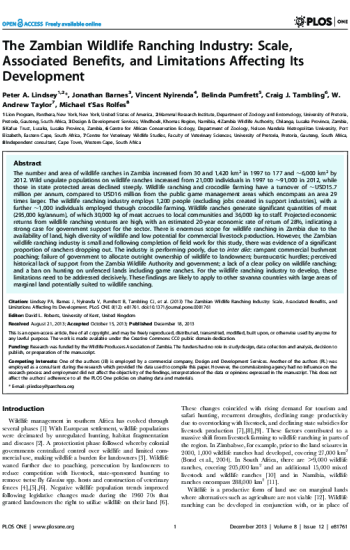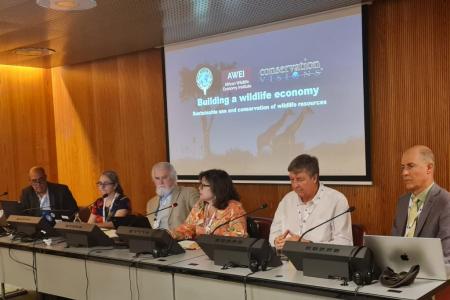
The Zambian Wildlife Ranching Industry: Scale, Associated Benefits, and Limitations Affecting Its Development
There is enormous scope for wildlife ranching in Zambia due to the availability of land, high diversity of wildlife and low potential for commercial livestock production. However, the Zambian wildlife ranching industry is small and following completion of field work for this study, there was evidence of a significant proportion of ranchers dropping out. The industry is performing poorly, due to inter alia: rampant commercial bushmeat poaching; failure of government to allocate outright ownership of wildlife to landowners; bureaucratic hurdles; perceived historical lack of support from the Zambia Wildlife Authority and government; a lack of a clear policy on wildlife ranching; and a ban on hunting on unfenced lands including game ranches.
Lindsey PA, Barnes J, Nyirenda V, Pumfrett B, Tambling CJ, Taylor WA, t'Sas Rolfes M. The Zambian wildlife ranching industry: scale, associated benefits, and limitations affecting its development. PLoS One. 2013 Dec 18;8(12):e81761. doi: 10.1371/journal.pone.0081761. PMID: 24367493; PMCID: PMC3867336.
Research
We support the free flow of information. Please share:
More content
-

Drivers of hunting and photographic tourism income to communal conservancies in Namibia
Mr Joseph Goergen …Hunting and photographic tourism provide ecosystem services that can facilitate conservation. Understanding factors influencing how tourism industries generate...
2024Research -

SANParks Vision 2040: A New Era for Conservation in South Africa
Mrs Emily TaylorReimagining Conservation: SANParks' Vision 2040
South African National Parks (SANParks) has unveiled its ambitious Vision 2040, a…
Articles -

In defence of wild meat’s place at the table
Tim VernimmenQ&A — Conservation scientist E.J. Milner-Gulland
Sustainable and safe consumption of wildlife is possible, and important for those…
Articles -

The diverse socioeconomic contributions of wildlife ranching
Candice Denner…The diverse socioeconomic contributions of wildlife ranching are increasingly recognized as a vital element of sustainable development, particularly...
2024Research -

A conflict of visions: Ideas shaping wildlife trade policy toward African megafauna
Mr Michael 't Sas-Rolfes…The issue of wildlife trade is a major concern for the conservation of African megafauna, such as elephants...
2024Research -

Barriers to the Participation of the Traditional Leadership Institution in Promoting Rural Agricultural Development
Dr Wiseman Ndlovu…The Traditional Leadership Institution (TLI) is constitutionally recognised to promote rural development in South Africa. It works with...
2022Research -

Elephant in the Room - Why a trophy hunting ban would hurt conservation and development
Dr Francis Vorhies“Trophy hunting, if well managed, conserves wild species and habitats and enhances livelihoods in rural communities.” - Dr...
2024Briefs -

Biodiversity means business: Reframing global biodiversity goals for the private sector
Dr Francis Vorhies…The Convention on Biological Diversity strategic goals direct the conservation and sustainable use of biodiversity from global to...
2019Research -

The 33rd Meeting of the Animals Committee of the Convention on International Trade in Endangered Species of Wild…
Articles
Get updates by email
Through impactful research, stakeholder engagement, and professional development, AWEI is supporting the wildlife economy across Africa. Please subscribe for occasional updates on our work and forthcoming events.
Sign up for a quarterly dose of AWEI insights
In a complex and changing world, AWEI generates strategic ideas, conducts independent analysis on wildlife economies, and collaborates with global scholar-practitioners to provide training and expertise for biodiversity conservation, climate resilience, and inclusive economic opportunities in Africa.
